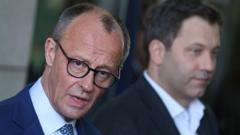With new plans for addressing underfunded infrastructure, the incoming government will seek to restore Germany's industrial reputation while navigating tough economic realities.
Germany's Infrastructure Dilemma: A New Approach under Friedrich Merz

Germany's Infrastructure Dilemma: A New Approach under Friedrich Merz
As Germany's new Chancellor, Friedrich Merz looks to revitalize the country's crumbling infrastructure through significant new spending measures.
Germany's infrastructure, once a symbol of strength, now stands on the brink of failure. Crumbling bridges, neglected roads, and insufficient military capabilities have led the new Chancellor, Friedrich Merz, to take bold steps.
During a recent parliamentary session, Merz successfully negotiated the approval to exceed constitutional borrowing limits, allowing an unprecedented investment of €500 billion (approximately $556 billion) over the next twelve years. This funding, a relief from the longstanding debt brake, will primarily target infrastructure improvements that have been overlooked by previous administrations through years of aversion to higher debt levels.
A significant portion of this investment—€200 billion—will be allocated to state governments and a newly established climate fund. The Christian Democrats, led by Merz, alongside their coalition partners from the Social Democratic Party, aim to funnel around €150 billion directly into infrastructure projects before their term concludes in 2029.
As Germany transitions leadership, the focus on revitalizing essential national infrastructure reflects a critical response to years of neglect and an urgent need to restore public confidence in the country's infrastructure capabilities.
During a recent parliamentary session, Merz successfully negotiated the approval to exceed constitutional borrowing limits, allowing an unprecedented investment of €500 billion (approximately $556 billion) over the next twelve years. This funding, a relief from the longstanding debt brake, will primarily target infrastructure improvements that have been overlooked by previous administrations through years of aversion to higher debt levels.
A significant portion of this investment—€200 billion—will be allocated to state governments and a newly established climate fund. The Christian Democrats, led by Merz, alongside their coalition partners from the Social Democratic Party, aim to funnel around €150 billion directly into infrastructure projects before their term concludes in 2029.
As Germany transitions leadership, the focus on revitalizing essential national infrastructure reflects a critical response to years of neglect and an urgent need to restore public confidence in the country's infrastructure capabilities.





















